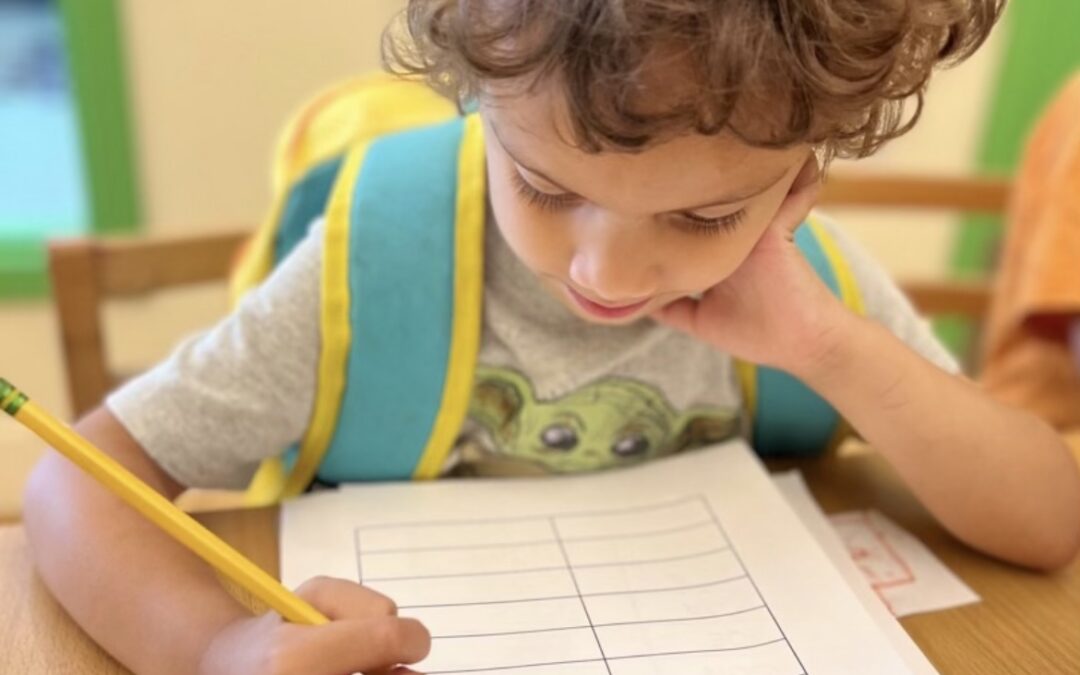“Reflective learning encourages children to take charge of their own learning and increases their success in all areas of development, including self-regulation, conflict resolution, planning, and even literacy.”
What You’ll Learn
- What is reflective learning?
- How does reflective learning lead to successful learning?
- How do meaningful questions encourage reflection?
- What questions can I ask at home?
Today was your child’s first day of school. You’ve spent all day wondering what they have been up to, who they played with, what they learned, whether or not they’re having fun, and so on. It is finally time to pick your child up and you eagerly ask, “how was school?” Instead of the exciting play-by-play you were expecting, your child simply responds with, “good.”
First of all, congratulations for making it through your child’s first day of school; I am sending a virtual hug your way! Now, let’s talk about why the question, “how was school?” often leads to a surface-level response and what questions you can ask instead to guarantee an interesting response and an opportunity for reflective learning.
Reflective Learning
Reflection is the process of striving for a deeper understanding of learning through the analysis of events, activities, and experiences—this process is essential for successful learning, even for young children!
Reflective learning encourages children to take charge of their own learning and increases their success in all areas of development, including self-regulation, conflict resolution, planning, and even literacy. When young children reflect, they are also building the following critical thinking skills:
-
- Remembering
- Questioning
- Investigating
- Explaining
- Translating
- Sharing
- Revisiting
Meaningful Questions Encourage Reflective Learning
Children sometimes find it difficult to talk about school and feel pressure to sum up their entire day – a not so easy task, even for adults – when they hear the question, “how was school?” That surface-level response I mentioned earlier is often what we hear when we ask this question, simply because it’s easier!
This does not mean we shouldn’t ask children how their day was; it means that we have to be more intentional about what questions we ask and how. Asking meaningful questions about your child’s day will encourage your child to talk more and will help them reflect on their learning. Moreover, these types of questions show that you are interested in and value your child’s learning. While this interest will boost your child’s happiness and wellbeing, you are also gaining a better understanding of how your child learns.
10 Meaningful Questions to Ask at Home
The next time you talk to your child about school, try asking the following open-ended questions:
- What did you like the best about school today?
- What made you laugh today?
- Were there any moments today when you felt proud of yourself?
- What do you want to learn more about?
- What does your classroom look like at the moment?
- What happened today that made you feel excited to learn?
- Who did you play with today?
- What was the most interesting thing you learned today?
- Were there any moments today when you felt worried or scared?
- Do you have any questions about something you learned today?
When asking these questions, be sure to keep the conversation positive and powerful. You can do this by simply giving your child your full attention, taking seriously whatever your child tells you, and using respectful language when referring to their experiences. Lastly, be sure to thank your child for sharing with you, both the highlights and the challenges. This will promote a trusting relationship and encourage your child to tell you more.
Empowering Takeaways
- Reflective learning is essential for academic and developmental success
- Simple, clear, and positive questions are the key to encouraging reflective responses
- Reflective learning can happen at home with parents/caregivers
Be vibrant and keep thriving!
This article was last reviewed or updated on September 8, 2023.
References
Aguilar, E. (2016, October 27). 15 Questions to replace ‘how was school today?’ George Lucas Educational Foundation. https://www.edutopia.org/blog/parents-fifteen-questions-replace-how-was-school-today-elena-aguilar
Green, J. & Foley, J. (2015, July). Supporting children’s reflection with phones and tablets. NAEYC. https://www.naeyc.org/resources/pubs/tyc/jun2015/supporting-childrens-reflection#:~:text=Encouraging%20reflection%20is%20an%20important,in%20school%20and%20in%20life
Institute for Teaching and Learning Innovation. (n.d.). Reflective learning. University of Queensland, Australia. https://itali.uq.edu.au/teaching-guidance/teaching-practices/active-learning/reflective-learning
Learning Pool. (n.d.). Why reflection encourages a better learning experience. https://learningpool.com/why-reflection-encourages-a-better-learning-experience/#:~:text=How%20Does%20Reflection%20Benefit%20You,their%20personal%20strengths%20and%20weaknesses
Miller, A. (2019, May 8). Teaching strategies: treating reflection as a habit, not an event. George Lucas Educational Foundation. https://www.edutopia.org/article/treating-reflection-habit-not-event/
Raising Children Network. (2021, October). Talking about school. https://raisingchildren.net.au/school-age/school-learning/school-homework-tips/talking-about-school



